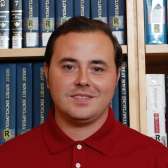
"The Story of Words to Death: Language, Institutional Implications and Socio-Political Aspects Regarding the Jews during the Retreat from Bessarabia and North Bukovina (June-August, 1940): Actions, Consequences, Attitudes (Case Study: The Massacres of Galati and Dorohoi)"
Professional Background
Iulian-Alexandru (Alex) Muraru is a Ph.D. candidate in political science and Associate Professor within the Political Science, International Relations and European Studies Department at Alexandru Ioan Cuza University in Romania. He received an M.A. in international relations and Romanian history, another M.A. in European studies, and a B.A. in political science from the same institution. For his Tziporah Wiesel Fellowship, Mr. Muraru conducted research for his project, “The Story of Words to Death: Language, Institutional Implications and Socio-Political Aspects Regarding the Jews during the Retreat from Bessarabia and North Bukovina (June-August, 1940): Actions, Consequences, Attitudes (Case Study: The Massacres of Galati and Dorohoi).”
From 2005 to 2009, Mr. Muraru was a counselor within the Chancellery of the Romanian Prime Minister and in 2007 served as the personal counselor of the Romanian Minister of Justice. Since 2009, Mr. Muraru has collaborated with the Institute for the Investigation of Communist Crimes and the Memory of the Romanian Exile and with the Romanian Center for Communist and Post Communist Studies. He is author of the book, The Monarchal Republic: The Contribution of the Royal Family to Romani’s Euro-Atlantic Integration (2009) as well as many articles, including, “The Big Partners Can Make You Big and Whole Again: The American Reunification of Germany” in European and Security Studies (2007) and “Monarchism and Republicanism. Concepts, Supporters, Polemics” in The Annals of the Political Science Department, Alexandru Ioan Cuza University (2005-2006). Mr. Muraru is the recipient of a 2008-2011 Doctoral Scholarship within the POSDRU program (The European Social Fund) as well as an Erasmus scholarship at the Utrecht University, Netherlands (2005). In 2008, he was decorated by HM King Michael of Romania, the last surviving head of state from World War II. He has presented his research at various conferences, summer schools and international seminars throughout Europe. Mr. Muraru is a native speaker of Romanian with language skills in English and French.
Fellowship Research
During his tenure at the Center, Mr. Muraru studied the retreat of Romanian troops from North Bukovina and Bessarabia and the atrocities committed against Jews by both the military and civilians during the retreat from June-July 1940. The main goal of his project was to reveal a relation to and the connotations of a genocide on which a military and civil situation is overlaid: the retreat of the Romanian troops from North Bukovina and Bessarabia as a result of the Soviet ultimatum. He sought to establish the number of the crimes committed against Jews and unmask the contributions of some Romanian historians who twisted the truth regarding crimes committed by Romanian civilians and military against the Jewish population on the background of the forced retreat. His research focused on the increase in exaggerations of a “Jewish plot” and their consequences, as well as how violent expressions recur in language at certain times. The project tried to bring to light the connected actions of the massacres: individual civil crimes, robberies, physical violence in trains and train stations against the Jews in Moldova, and the plundering of Jewish properties by the Romanian military. Mr. Muraru utilized the Museum’s archival collections, including the documents from the Military Archives of Romania, the National Archives of Romania, the Collection Ministry of the Interior, and the General Inspectorate of the Romanian Gendarmerie, as well as documents referring to Bessarabia and Bukovina. He also used sources at other institutions such as the Library of Congress.
Mr. Muraru was in residence at the Mandel Center from September 1, 2010 to February 28, 2011.
